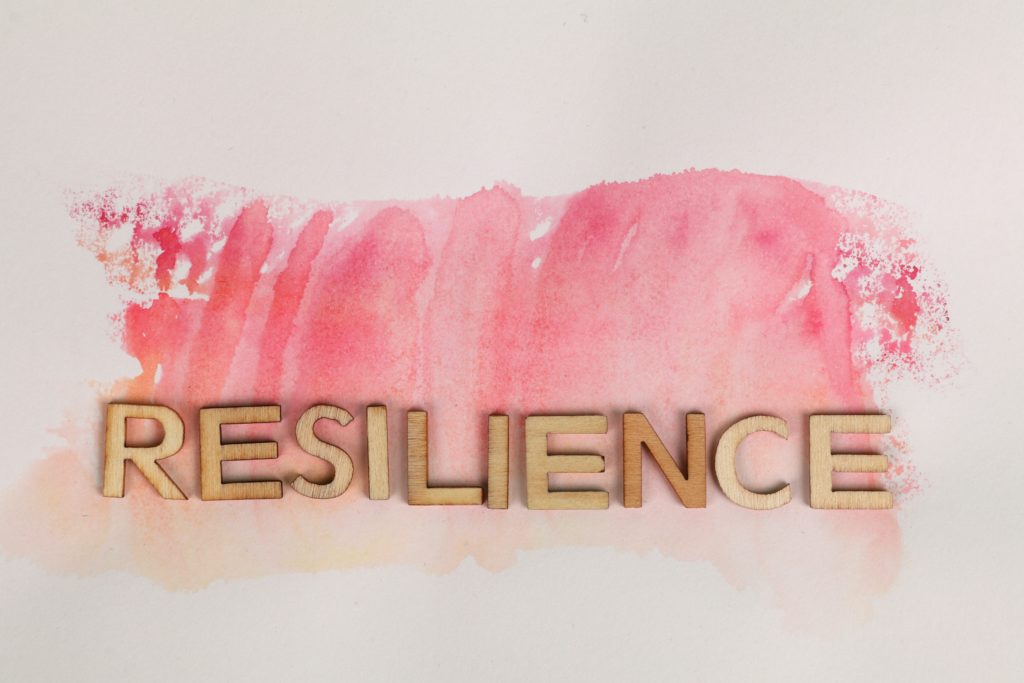In this blog we’ll be looking at five tips to building your resilience. Today we’re going to look at the first two, and next week we’ll be looking at the other three tips. Here we go!
Self-Compassion
Being self-compassionate is such a core component of resilience. How do you talk to yourself? You need to treat yourself in the way you treat the people you care about the most. The way you talk to yourself should be emotionally warm and supportive; as opposed to cold, harsh and critical. If you find yourself putting yourself down and being overly self-critical, this will lead to shame. Research has shown this can activate our sympathetic nervous system, which mobilises us for threat, releases cortisol and adrenaline in our bodies, and triggers our fight, flight, freeze, or flop response. When we criticise ourselves our heart rate and blood pressure increase, and our digestive system is negatively affected. Our brains just don’t work properly in these conditions as we can’t think clearly and we hone our attention to focus on threat, which builds anxiety and fear of failure. This means you are less likely to take risks, try new things and learn from past experiences – all important for resilience building. To be resilient we need to be mostly operating under our para-sympathetic nervous system. This is the nervous system that kicks in when we feel calm, safe and grounded and helps us to think clearly, make good decisions and healthy choices and have a flexible perspective. It also improves our immune system functioning and increases our heart rate variability – which means the heart can react to different situations, rather than be stuck in a high or low pattern.
This para-sympathetic nervous system can be activated by having a kinder, more self-compassionate inner voice. Having a kind inner voice may not come naturally and so the way to develop it, if you identify that it’s missing, is to fake it ‘til you make it! It may feel awkward but if you start intentionally practising being kinder and talking to yourself in the way you do to people you love the most in your life it will eventually become more natural and automatic. Other ways to make you feel more emotionally safe and grounded are spending time in nature, and anything that helps you to feel calmer, for example, walking in nature, Mindfulness, prayer, being with animals etc. – whatever works for you!
Connecting with others
As we develop more self-compassion, we are more able to build strong connections with other people. We are social beings and have a physical and psychological need to be connected to others. We strengthen our resilience when we feel a sense of belonging, with our families, friends or communities. Research has shown that people who feel socially isolated experience a significant drop in their body temperature. Feeling a sense of belonging is the opposite to wanting and needing to ‘fit in’. ‘Fitting in’ requires us to try to change aspects of ourselves in order to be socially accepted. However, true belonging comes from a state of mind where you accept yourself, care less about what others think of you, and know that you are good enough, just as you are. In short, resilience is built when you become your own best friend, and this can get easier as we get older. Connection and belonging springs from an awareness that suffering and feelings of personal inadequacy are part of the shared human experience. We all suffer. We all feel pain. We all experience self-doubt and have our personal struggles. When times are hard it’s really easy to think that no one else can understand and that no one else seems to have experienced what you’re going through, and that may be true. But in order to develop resilience so we can survive, grow and even thrive after adversity, having a sense that we are connected to the human race as a whole is fundamental.
Dr Gemima Fitzgerald bio
It wasn’t until I was in my mid-30s, and going through a really difficult divorce and feeling like a huge failure, that I decided to start again and study Psychology BSc at the University of Sussex in the UK. After I finished that, I embarked on a doctorate in Clinical Psychology at the University of Surrey. Following qualification, I worked for a hospice in their Specialist Palliative Care Psychology Service before becoming the lead for the hospice Bereavement Service. I have always had a strong interest in teaching and empowering others, and my particular expertise is in the area of building resilience. My doctoral research was around the processes involved in developing resilience, and I was invited to do a TEDx talk on this subject in 2015.
I am now Principal Psychologist in a male prison where I lead the psychology team in the mental health service, which has enabled me to work with the most challenging mental health and behavioural difficulties. As well as my lead role in the prison, I founded my own company and work freelance in a diverse range of settings; from private practice, to working with homelessness, hospices, family carers of people with dementia, and the NHS. I regularly run training courses on building resilience for staff, carers and patients as I love seeing people learn these skills and start to feel a greater sense of well-being.


